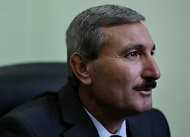By LIAM STACK

ANTAKYA, Turkey — Once one of Syria’s closest allies, Turkey is hosting an armed opposition group waging an insurgency against the government of President Bashar al-Assad, providing shelter to the commander and dozens of members of the group, the Free Syrian Army, and allowing them to orchestrate attacks across the border from inside a camp guarded by the Turkish military.
The support for the insurgents comes amid a broader Turkish campaign to undermine Mr. Assad’s government. Turkey is expected to impose sanctions soon on Syria, and it has deepened its support for an umbrella political opposition group known as the Syrian National Council, which announced its formation in Istanbul. But its harboring of leaders in the Free Syrian Army, a militia composed of defectors from the Syrian armed forces, may be its most striking challenge so far to Damascus.
On Wednesday, the group, living in a heavily guarded refugee camp in Turkey, claimed responsibility for killing nine Syrian soldiers, including one uniformed officer, in an attack in restive central Syria.
Turkish officials describe their relationship with the group’s commander, Col. Riad al-As’aad, and the 60 to 70 members living in the “officers’ camp” as purely humanitarian. Turkey’s primary concern, the officials said, is for the physical safety of defectors. When asked specifically about allowing the group to organize military operations while under the protection of Turkey, a Foreign Ministry official said that their only concern was humanitarian protection and that they could not stop them from expressing their views.
“At the time all of these people escaped from Syria, we did not know who was who, it was not written on their heads ‘I am a soldier’ or ‘I am an opposition member,’ ” a Foreign Ministry spokesman said on the condition of anonymity in keeping with diplomatic protocol. “We are providing these people with temporary residence on humanitarian grounds, and that will continue.”
At the moment, the group is too small to pose any real challenge to Mr. Assad’s government. But its Turkish support underlines how combustible, and resilient, Syria’s uprising has proven. The country sits at the intersection of influences in the region — with Iran, Hezbollah in Lebanon, Saudi Arabia and Israel — and Turkey’s involvement will be closely watched by Syria’s friends and foes.
“We will fight the regime until it falls and build a new period of stability and safety in Syria,” Colonel As’aad said in an interview arranged by the Turkish Foreign Ministry and conducted in the presence of a Foreign Ministry official. “We are the leaders of the Syrian people and we stand with the Syrian people.”
The interview was held in the office of a local government official, and Colonel As’aad arrived protected by a contingent of 10 heavily armed Turkish soldiers, including one sniper.
The colonel wore a business suit that an official with the Turkish Foreign Ministry said he purchased for him that morning. At the end of the meeting, citing security concerns, the colonel and a ministry official advised that all further contact with his group be channeled through the ministry.
Turkey once viewed its warm ties with Syria as its greatest foreign policy accomplishment, but relations have collapsed over the eight months of antigovernment protests there and a brutal crackdown that the United Nations says has killed more than 3,000 people.
Prime Minister Recep Tayyip Erdogan of Turkey was personally offended by Mr. Assad’s repeated failure to abide by his assurances that he would undertake sweeping reform. Turkish officials predict that the Assad government may collapse within the next two years.
“This pushes Turkish policy further towards active intervention in Syria,” said Hugh Pope, an analyst with the International Crisis Group. He called Turkey’s apparent relationship with the Free Syrian Army “completely new territory.”
via Turkey Shelters Anti-Assad Group, the Free Syrian Army – NYTimes.com.

Leave a Reply